How long should a blog post be? Is there a magical number that will guarantee success? Bloggers, digital marketers, and SEO experts all seem to have different opinions on this topic.
In terms of SEO, search engine algorithms have been continuously evolving and now place more emphasis on quality than ever before.
This means that longer content pieces tend to rank higher since they often offer more comprehensive coverage.
We know that the length of time someone spends on a web page also factors into SEO for blogs. The longer the post or page is, the higher the potential dwell time.
It’s also safe to say that longer blog posts are more likely to generate higher quality, longer-lasting engagement than shorter posts.
So does that mean the longer the post the better?
Not necessarily.
In this article on how long should a blog post be, we will cover:
4 Factors That Impact How Long a Post Should Be
No two blog posts are created equal, so there is no one-size-fits-all answer when it comes to the ideal blog post length.
Different factors will play into how long a post should be. Here are some of the top factors.
1. Your Industry
Different industries have different needs when it comes to ideal blog post length.
For example, a B2B technology company may benefit more from a higher word count for in-depth analysis and research, while a retail company might do better with writing blog posts to feature their products that are shorter and snappier.
2. Your Audience
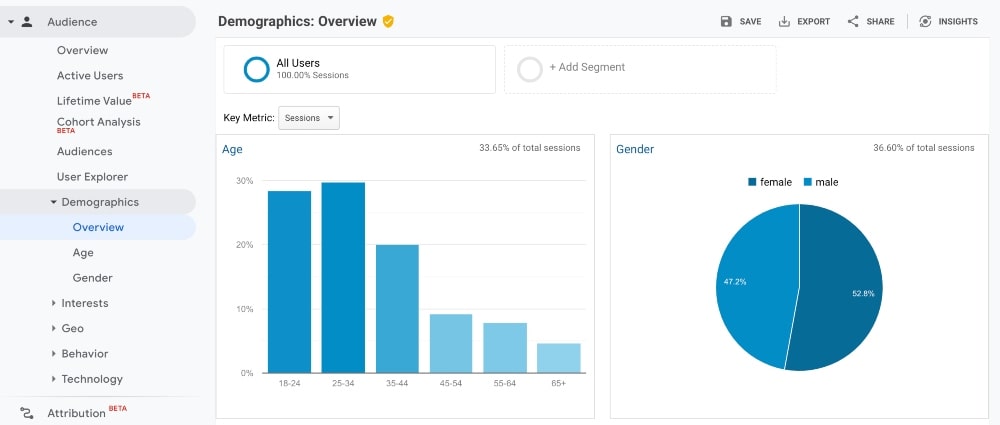
Your audience should always be top of your mind whenever you write a blog post.
What type of reader is your blog post targeting?
If you’re publishing content for a tech-savvy audience, they will probably want more information and data in their posts.
On the other hand, if you’re writing for a younger audience, smaller, snackable content like shorter posts might be more appropriate.
You can view your audience data in Google Analytics or in more specific platforms (i.e. YouTube Analytics).
3. Topic and User Intent
The topic and search intent, or why someone is searching for a specific piece of content, should also play a role in determining how long a post should be.
If the topic or question requires more explanation and a detailed answer, the optimal length may need to be a little longer. This is often true for educational posts.
Conversely, if the topic is simpler and can answer readers’ questions in fewer words, short posts should be sufficient.
Are you creating academic or research-based content? In that case, longer posts are typically preferred.
Topics like “how to” or “tutorials” might require more detailed instructions, which could lead to longer articles.
On the other hand, lighter topics like “best of” or “top 10” lists are generally shorter.
4. Content Goals
Finally, consider what your blog content goals are.
- Are you trying to rank higher in search engine results?
- Generate more leads?
- Drive traffic to a specific page on your website?
- Do you want to rank for certain keywords?
- Are you trying to build backlinks for search traffic?
Your content goals and SEO goals will impact the blog post length and the type of information included.
Longer posts can give you more opportunities to target specific keywords and phrases, but they must also be relevant and engaging so readers don’t lose interest before reaching the end.
Benefits of Long-Form Blog Posts
Writing long-form content can have several benefits for SEO and engaging with your target audience.
Better Engagement and Relationships
Long-form blog posts offer more opportunities for readers to connect with the content in meaningful ways, leading to higher levels of engagement.
They allow you to provide more detailed information to your readers, which helps establish trust and credibility.
Longer blog posts can also help create a deeper connection between your brand and its readers as they often offer an in-depth look at a certain topic or issue.
Increased Dwell Time
Well-written, long-form content is ideal not only for engagement but also for building relationships.
The more engaged a user is with your blog post, the more time they will spend on your page.
This factor is called dwell time and it’s a signal to Google you have written high-quality content.
If you can increase your blog post length while still maintaining relevancy for the reader and higher dwell time, your post should perform better in search engines.
More Keyword Opportunities
Longer-form content will also provide you with more opportunities to include your target keyword and other, related keywords in your content.
Using a keyword research tool will help you find keyword ideas for your content and help you target keywords with high search volume.
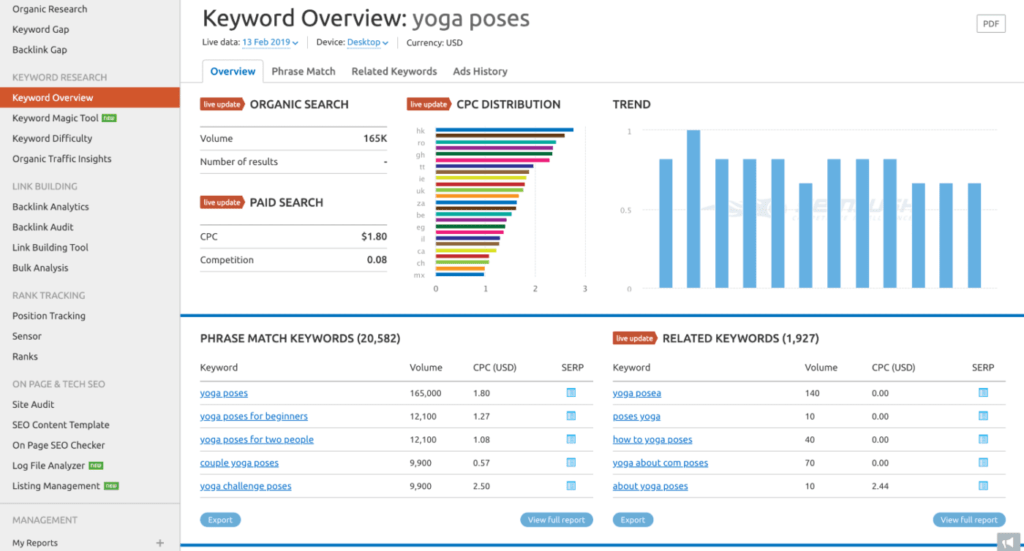
Our favorite is Ahrefs (pictured above), but Ubersuggest is a great free option.
Pillar pages, in particular, are typically long posts with very comprehensive information around one main topic or idea and also serve as a gateway to other posts on related subtopics (often called topic clusters).
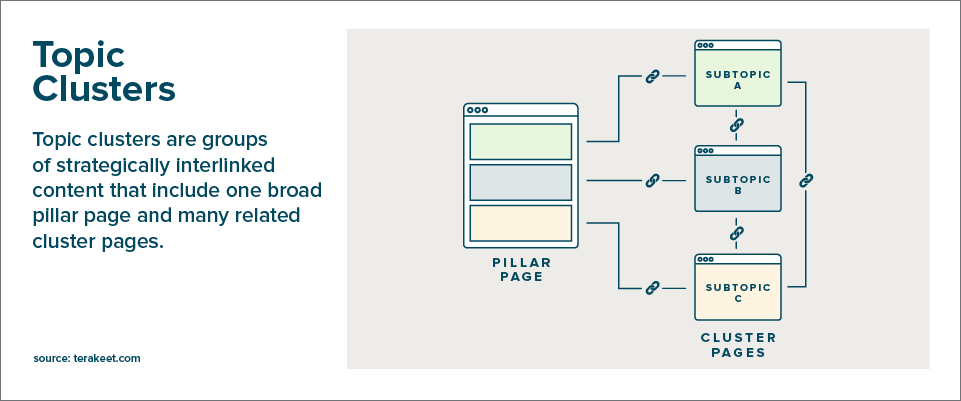
Our post on how to make money blogging is a prime example of a pillar post.
The ideal length for this type of blog post is a word count of anywhere from 2,000 to 10,000 words.
They tend to be comprehensive guides and are written to get picked up by search engines for a variety of related queries.
Improved SEO Rankings
It’s for all of the reasons above the average blog post length with a word count of over 2,000 words generally performs better in search results.
The content length isn’t the most important factor, but it is a factor.
Long-form content only makes sense when you can keep your reader engaged long enough on your page.
If your blog length is too long and uninteresting, people will leave the page and increase your bounce rate, which is bad for SEO.
Moz conducted a study to confirm these findings.
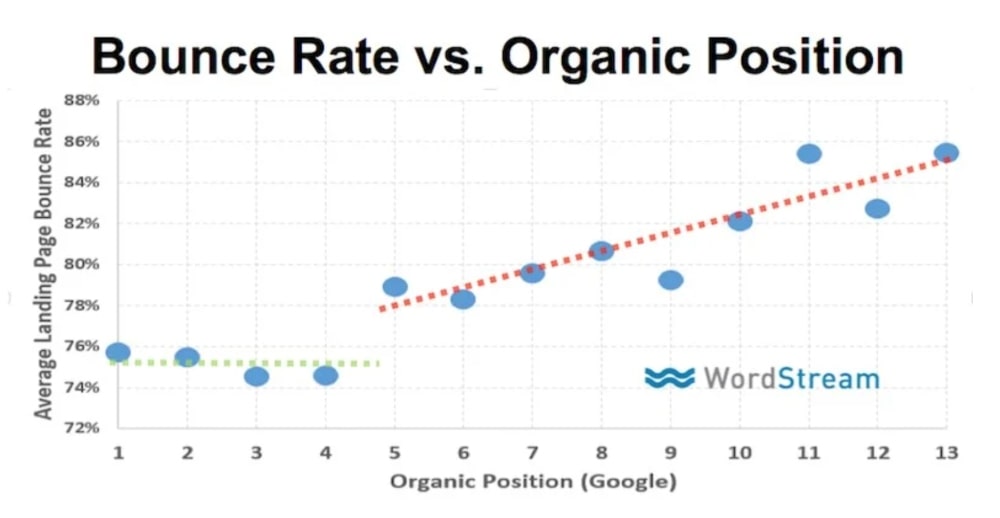
What is the Ideal Blog Post Length?
There is no perfect blog post length that fits all types of blog posts, purposes, and audiences.
We can’t give you an exact number or one ideal length, but the consensus seems to be that long-form blog posts with at least 1,000 words can provide enough detail for readers without being too overwhelming.
But if SEO is more important to you, blog posts of 2,000 words or more can help optimize your website for search engines better than shorter blog posts.
However, that doesn’t mean short blog posts don’t have a place in your content strategy—shorter content can still be effective if used strategically.
Average Word Count for Different Post Types
Here’s a breakdown of suggested word counts for different post types to help you when writing content.
Short-Form Blog Posts (200-400 Words)
These posts are often used to provide quick updates or announcements.
- News articles
- Press releases
- Podcast episode pages
- Other blog pages (About, contact, mission, and goals, etc.)
Medium-Form Blog Posts (600-1,000 Words)
Medium-length posts can be used to go into more detail and provide readers with more in-depth information.
- Product reviews
- Tutorials
- Case studies
Long-Form Blog Post (2,000+ Words)
Longer posts are great for providing comprehensive coverage of a topic and can help you rank higher in search engine results.
- How-to-guides
- Research reports
- Pillar posts and other blog posts for SEO
Best SEO Tool to Determine How Long a Post Should Be
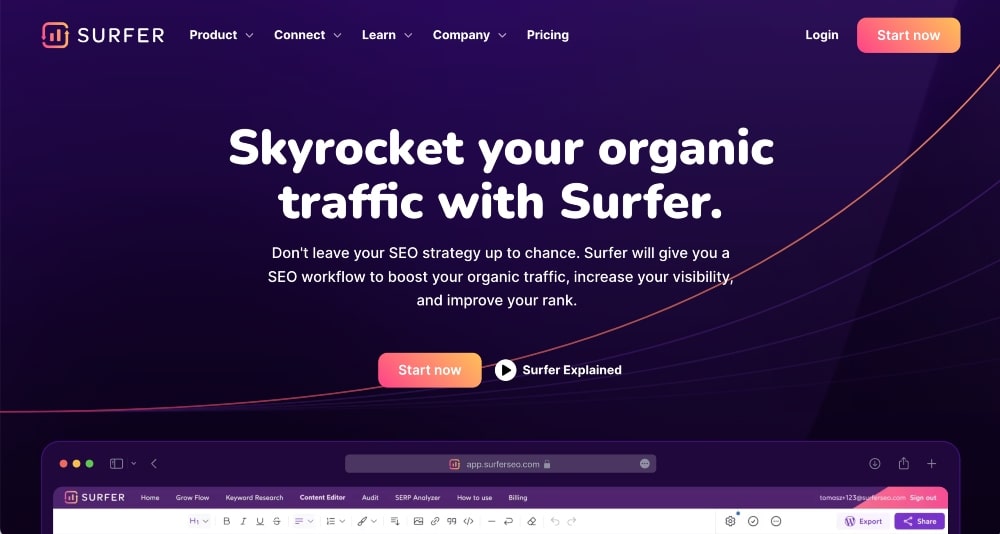
Surfer SEO is a powerful SEO content optimization tool that can help you determine how long your post should be.
Using the Content Editor in Surfer, you can enter the keyword for your post and generate an automatically optimized blog post template with the ideal length for each section of the text.
Surfer will tell you the ideal blog post length based on other top-ranking posts in search.
This suggested word count will give you an idea of how many words are necessary to achieve high rankings in search engine results pages (SERPs).
And it’s not just blog post length, Surfer will also tell you:
- How many headings you should have
- How many paragraphs
- How many images
- And also exactly what keywords to add and how often to add the suggested keywords
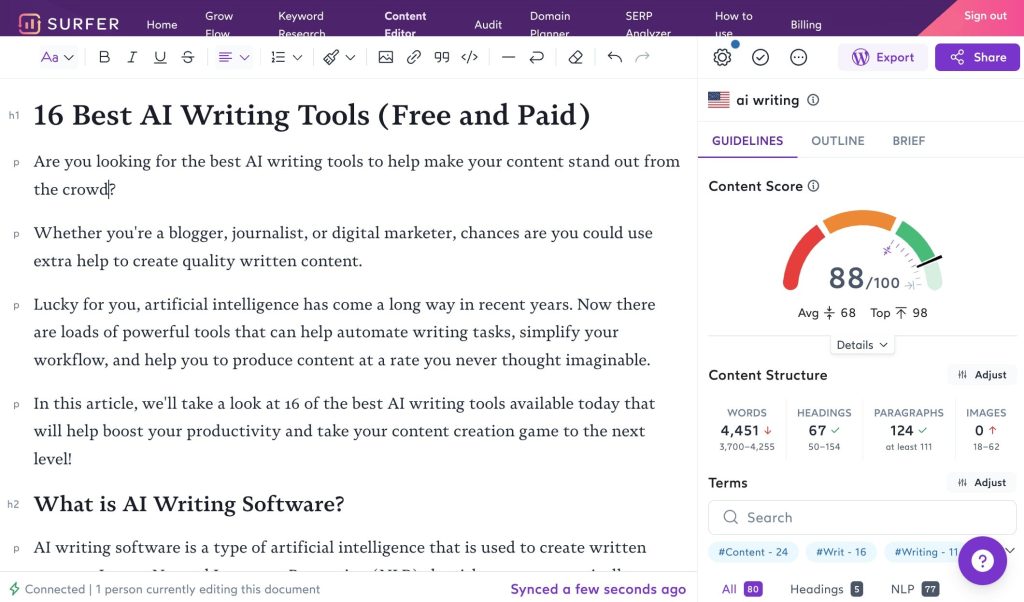
You’ll also get insights into competitor analysis, which shows you what other similar posts look like and what they are doing better than yours.
This helps inform where improvements need to be made to make sure your blog post stands out from the competition.
With Surfer’s help, you can determine the ideal length for your blog post, optimize it to target specific keywords, and create engaging content in no time.
SurferSEO is our favorite SEO tool for optimizing content.
FAQs About How Long a Blog Post Should Be
Key Takeaways for How Long Should a Blog Post Be
At the end of the day, there is no cut-and-dry optimal blog post length for every blog post that you write.
Each post is different and the blog post length will depend on a variety of factors, including:
- Industry
- Audience
- Topic and Search Intent
- Content Goals
Focus on providing well-researched, comprehensive blog posts with plenty of relevant keywords to ensure your blog posts resonate with your readers and with the algorithms.
The benefits of longer blog posts include:
- more engagement and better relationships with your audience,
- more opportunities for important keywords,
- higher dwell time,
- and ultimately better SEO results.
While long-form blog posts are going to win out as the most helpful content most of the time, it’s also important to remember that quality is far more important than quantity when it comes to creating content.
You should never fluff up your posts too much just to hit a certain blog post length.
This could cause your readers to get bored with your blog content and bounce from the page, which will only hurt your chances of reaching the first page of search.